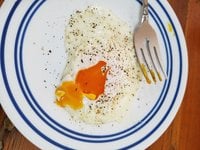Scotty from BI
Songster
- Aug 26, 2015
- 184
- 196
- 121
I have been raising chickens for about 8 years. I have 10 hens now about 1.5 years old. They are confined to a partially covered dirt run and very spacious coop. The run is quite large about 90 feet by about 6-8 feet with plenty of perches and ladders for them to move around in and on. I clean inside and out twice a day and their food is organic layer pellets from Modesto Mills mixed with Scratch and Peck organic whole seed Layer with corn. I also throw out about a cup of dried grubs from Scratch and Peck daily along with about 2 cups of mixed green and yellow vegetables like carrots, kale, spinach, etc. that are mixed in a blender to make them easy to digest every other day or so. I can not let them free range due to circumstances but they are healthy and produce many eggs.
So having said all that... Are my hens egg yolks as healthy as those free range chickens which have such dark orange yolks. I have read that the darkness or lightness doesn't really reflect how much omega 3 or nutrients are in the egg, but I have also heard that the darker the yolk the better. I am not sure what else I can do. My egg yolks are bright yellow not pale but definitely not dark or orange. I have tried feeding them marigolds, dandelions, kelp and more but can not seem to get that orange color.
How much vegetables and bugs does it take to effect the color of the yolk? I don't want to over feed them bugs and cut vegetables and have them short on the balanced feed they need.
comments and suggestions appreciated.
So having said all that... Are my hens egg yolks as healthy as those free range chickens which have such dark orange yolks. I have read that the darkness or lightness doesn't really reflect how much omega 3 or nutrients are in the egg, but I have also heard that the darker the yolk the better. I am not sure what else I can do. My egg yolks are bright yellow not pale but definitely not dark or orange. I have tried feeding them marigolds, dandelions, kelp and more but can not seem to get that orange color.
How much vegetables and bugs does it take to effect the color of the yolk? I don't want to over feed them bugs and cut vegetables and have them short on the balanced feed they need.
comments and suggestions appreciated.


 . Anyway, to get to the point, a darker yellow or even orange means your feeding the right diet to them and you should keep it like that.
. Anyway, to get to the point, a darker yellow or even orange means your feeding the right diet to them and you should keep it like that.

